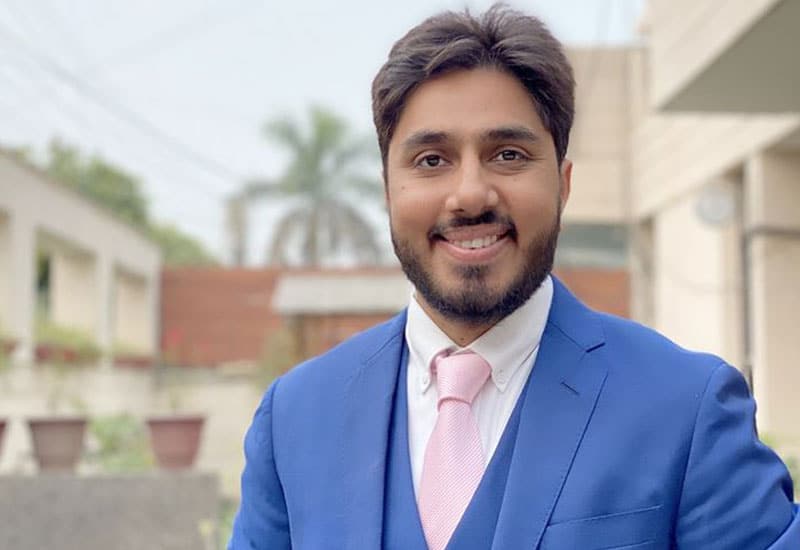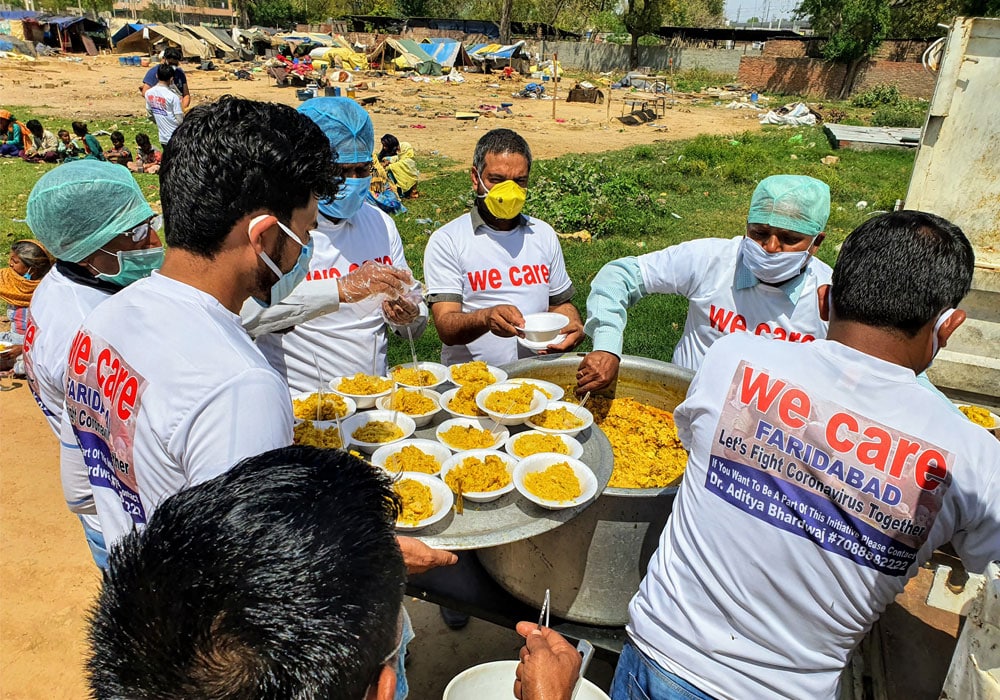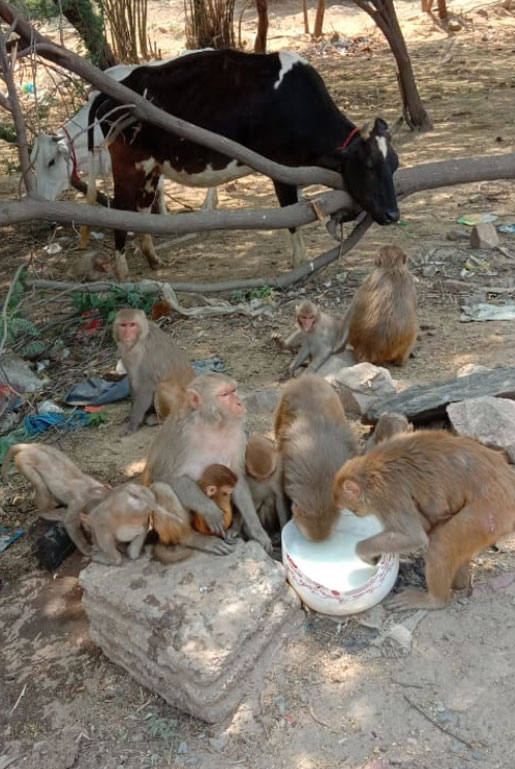32-year-old Aditya Prakash Bhardwaj, currently posted as the Deputy Commissioner of Income Tax in Faridabad, has promulgated the WeCare initiative that has served over 5 lakh meals at an average of feeding 5,000 people daily during the lockdown. Besides, the initiative has also contributed to animal welfare in the Faridabad district.
Making a career switch from a doctor to an IRS officer was never an easy option for Aditya. With a current job profile pertaining to tax administration, he believes in contributing multiple ways for the betterment of the country as a civil servant. He calls it his social duty instead of social service.
“The desire to create a hunger-free society inspired me to start this initiative for feeding those who are unable to meet their needs during the lockdown. Food should be available to humans as well as animals since it is their basic right and no one should go to sleep on an empty stomach”, says Aditya Prakash Bhardwaj.
In an elaborate conversation with LifeBeyondNumbers, Mr.Bhardwaj reveals more about his shift in career, initiatives, and the vision ahead.

“Whatever I am today, I am thankful to my country. The society’s contribution throughout the journey has been impeccable. Now, it is my responsibility to pay back to the society at large in my capacity,” he says with all his humility.
On his career shift from MBBS to UPSC
Motivation
Hailed from a family of humble backgrounds based in Narnaul, a small town of Haryana, Mr. Bhardwaj availed his school education from a local government school. After clearing the pre-medical test exam in 2006, Mr. Bhardwaj pursued MBBS from PGIMS Rohtak for five years. However, his heart was not in the work he was doing.
“I had no inclination towards the civil services from the beginning. When I came into medicine, I have always looked at bringing some changes in the society,” he says calling the transition ‘a dramatic story’. Even as a college student he conducted awareness sessions, medical and blood donation camps in the nearby slums.
While preparing for his medical post-graduation entrance examination in 2013, his visit to a friend in Delhi, who was preparing for UPSC, rendered the turning point in Aditya’s life.
“At that time, the Anna Andolan against the corruption in India was ongoing. And while driving back from Delhi in the middle of the night, we got into a heated conversation. He told me that it is one thing to want to change the world but getting into the system by cracking the exam and changing it from within is easier said than done. At that point, I took it as a challenge to get into the services and asked him to lend a few books to me,” explains Aditya.
Unaware of even the syllabus for UPSC, he got a few books and found them really fascinating, especially the chapter on fundamental rights. In no time, he was certain of his path ahead. Aditya immediately called up his Delhi-based friend Himangshu and firmly informed him- “I am going to prepare for UPSC”.
Familial Pressure
While it was one thing to inform his friends about the decision, convincing his parents about this was not easy. Since his father was the sole earning member of the family, there were lots of expectations from Aditya to walk on a path of predictability.
“After completing MBBS, I took up a job. My father was assured of the financial burden to be shared. My decision of preparing for UPSC was extremely unsettling and unpredictable for them. My parents did not talk to me for three months after I made my mind about it. They tried dissuading me by giving examples of how people fail at cracking it despite several attempts,” he reveals with a sigh.
“I was in Rohtak then, staying in the hostel. I packed my stuff from the hostel and left for Delhi from there. I did not go back to my home until I cleared the exam,” he added. Needless to say, staying away from the family and preparing for one of the most pressured exams of the country, Aditya was going through one of the weakest turfs of his life.
Despite being informed about his mother’s upcoming surgery just 10 days before the mains exam by his sister, Aditya had to make difficult decisions.
“I enquired about it from my mother, asked about her health but had to take a call whether I can make it for the surgery when my exams were this close. I made a call not to go because somehow, I knew that it was my only shot at it and I cannot let go of even a single day of preparation. I was vulnerable, yet determined,” he reveals how he dealt with one of the most difficult times in his life and stayed resolute.
Sticking to IRS
Even after clearing the examination amid the soaring expectations of him taking more attempts for better ranks, Mr. Bhardwaj had to take firm calls regarding his career.
“For me, it was a matter of immense satisfaction that I prepared myself without any coaching or external assistance except taking a few test series and managed to get through it. In fact, belonging to my background with a relatively weaker command of the English language, it was a big revelation to me that with confidence and hard work, anyone can achieve this, no matter what the background is. So, as I was posted for the first time in Faridabad in 2017, I decided not to sit for UPSC again,” he explains.
Instead, he made up his mind to simultaneously do sessions around the local government schools in Faridabad boosting their levels of confidence and spread the message around. “I felt it is important to tell these students that they can also do whatever they want to if they put in their heart and soul into it”, Mr. Bhardwaj tells LifeBeyondNumbers.
Every weekend since then for the past three-years, barring the span of lockdown, he has been conducting these counseling sessions at the various government schools. So far, he has been able to reach out to at least 67 government schools in both Faridabad and his hometown, Narnaul.
On his social responsibility – The WeCare Initiative
Providing Meals
Amid an unforeseen pandemic situation, the scale and duration of the initiative were hardly foreseeable at the beginning. Faridabad being an industrial area, had many laborers who rendered unemployed due to the lockdown and were in dire need of daily meals. Besides, as Faridabad lies between Delhi and UP, Mathura Express Highway was filled with laborers attempting to make it to their respective hometowns on foot.
“We had to make sure to provide them with food that is readily eatable for them since they were unable to make use of the dry rations,” explains Mr. Bhardwaj. The only way to do that was to set up a community kitchen capable of cooking enough meals at a time.

“I contacted the temple authorities lying along the Mathura Road. Temple kitchens did have the capacity to cook at least 500 meals at a time. In return for the assurance of keeping them clean and tidy, we were lent the kitchens,” he reveals.
Immediately after the lockdown was announced, he created a WhatsApp group, which currently consists of over 100 members in it. He included all his bureaucrat friends in it irrespective of the services they are in and they were requested for their contributions. The beautiful part about the initiative was that all the contributions made for the initiative were in kind.
“Some provided rice, some arranged for the cooking oil, some gave us wheat flour or even some lent us their vehicles for the distribution of the meals. We took the first day of the lockdown to discuss and arrange and second day onwards we were in action,” Mr. Bhardwaj says.
In the initial days of the initiative, with a group of 65 to 70 dedicated volunteers spearheading the execution, the initiative took off on the solid ground. The WhatsApp forwards of the initiative had been converted to posters and fliers and their contact details reached quite a lot of people who have been in need in the area. The initiative was able to serve more than 5 lakh meals to people during the period.
Animal Welfare
On the 4th day of the lockdown, Aditya came to know of the unfortunate deaths of the stray monkeys near the Faridabad railway station. Upon enquiring, he realized that due to the decreasing footfall of humans around the areas, these strays are also dying of starvation.
“Henceforth, we decided to collect the extra food materials from the day’s cooking venture and feed the stray animals including dogs, cows, and monkeys at night. Since we were already running short of resources, we had to make sure that not even a single grain of materials gets wasted,” he mentioned.

The scarcity of water during summers in the arid Aravalli region near Faridabad presented with further difficulties for animals. Thus, the installation of water tubs and buckets along the road was the next endeavor to be taken up.
“We collected used water buckets and tubs from people and at the beginning installed around 200 of them at the stretch of the road for animals. For birds, we had hung them from trees. We also ensured to replace the water every 2 to 3 days,” he explains.
So far, more than 300 such plastic water tubs were installed along the way. Following their footsteps, People for Animal, a Faridabad-based NGO, has also taken similar steps.
Current Activities
As of now, every weekend WeCare has been distributing masks among the orphanages and old-age homes of the area, working for the animal welfare as well as responding to emergency calls, over the phone, and WhatsApp, where there are ration shortages.
Instead of cooked food currently, WeCare is providing dry rations to organizations and needy people upon being contacted. Besides, protein diets are also being distributed among pregnant women and lactating mothers in the nearby slum areas under the flagship of the initiative.
Mr. Bhardwaj has also extended employment opportunities for women of Kanwara village in Greater Faridabad by establishing a sewing center in the village for instilling the spirit of self-reliance in them.
“Though I initiated WeCare, it soon turned into a community initiative where everyone has contributed according to their capacities and has made it successful,” he humbly remarks.
Challenges Faced
As with every noble initiative, challenges came hand in gloves. The first among those was the skewed supply and demand ratio. “The need was a lot more than the resources we had. Identifying who needs our services the most was a daunting task,” explains Aditya.
Apart from that, since it was voluntary work, keeping the volunteers motivated has been quite challenging. After almost a month of lockdown, the numbers of the volunteers started dwindling. “At least, twice a week I had to call for a meeting to remind them of the importance of the work we have been doing,” Mr. Bhardwaj shares with us.
In fact, at least 40 percent of the plastic tubs installed by the initiative for keeping water for animals were stolen in the middle of the night. “I was wondering why would someone think of stealing old tubs/buckets!” he adds with a witty chuckle.
The Road Ahead
Though Mr. Bhardwaj definitely wishes to give the initiative a formal shape as a registered organization, lots of planning still needs to be done. Unless the uncertainty owing to the pandemic subsides, he is unwilling to expose anyone to the risk of contagion.
“Since the main arena of work would be education which requires interactions with children, anything that we take forward can only be possible after the pandemic situation subsides completely,” he says with determination.
Though he had already been working in the field of education for the past three years, he is hopeful that now his endeavors have gotten a name and a strong back up of a group of like-minded volunteers.
“The slum kids of the area, students of local government schools, are being deprived of education for the past 4-months of lockdown. To resolve this situation, I am currently in conversation with various experts in the field. There are a few alternatives that have come up like intermittent installation of projectors in these areas to play classroom lessons and lectures for these children,” he envisions the nature of work he is willing to take up next.
The IRS officer of an exceptional academic caliber is also quite artistically inclined as he loves spending his leisure in penning down his thoughts and emotions in the form of poetry and short stories that reflect upon various issues of contemporary social relevance.
Amid the pandemic situation, he advises everyone to commit to physical distancing but not the emotional one. “I believe both physical and mental health is equally important. The isolation caused by lockdown has really hampered our mental health. For some people, it is an extremely depressing situation, and merely connecting to them over the phone can also help them remain motivated,” he remarks.
“Our success is not only ours but also of the society at large that helped us getting nurtured in the right direction. Even if one can do a little to pay it back to the society, it may have mattered a lot,” Mr. Bhardwaj says reminding us of the importance of being empathetic and not merely sympathetic.
If everyone in today’s world can show even an iota of empathy towards other living beings as Mr. Bhardwaj does, transforming the world for better would turn into a work of collective.
Kudos to Aditya and his WeCare initiative for making such a positive impact possible!

